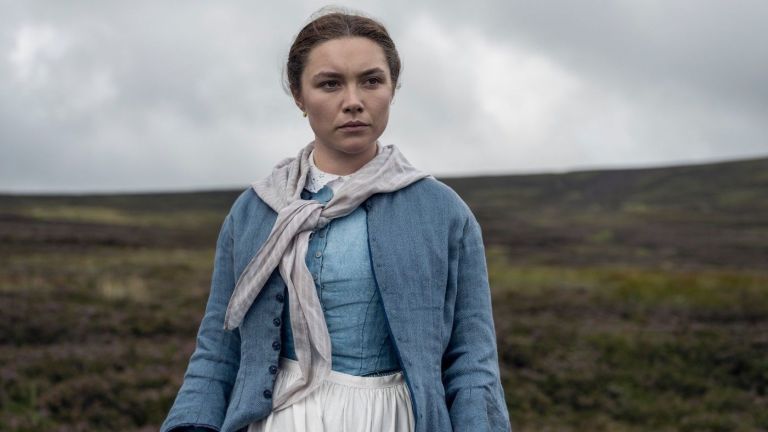The Wonder: Florence Pugh Finds Antidote to Don’t Worry Darling Nonsense
Florence Pugh and Netflix’s psychological thriller is a real period piece that interrogates many of the same ideas as Don’t Worry Darling... but to far more evocative and moving results.

By a strange quirk of timing, I happened to finally catch Don’t Worry Darling, Florence Pugh and Olivia Wilde’s high-concept psychological thriller run into the ground by gossipy drama. I managed to watch it only the night before Pugh’s lesser-known 2022 project, The Wonder. As to little surprise, Don’t Worry Darling was not nearly good enough to withstand any whisper of scandal, but what shocked me was how The Wonder hits almost all of the same beats—motherhood and sexuality, grief and belief, rituals of self-delusion—and does them so much better. There’s even a more incisive commentary on building false houses around ourselves! To wit:
The opening shot of Sebastián Lelio’s (Disobedience, Gloria Bell) period drama at first resembles Nathan Fielder’s intensely awkward, unflinchingly meta HBO series, The Rehearsal: a warehouse containing a movie set. Though The Wonder is meant to be focused on the 1862 Irish home of the O’Donnell family, within which a supposed miracle will be interrogated, the audience is introduced to the house from the back. The first thing we witness is the modern scaffolding propping it up, the fabrications outside of what we must come to believe is an attic room in which a devout young girl will slowly waste away.
“The people you are about to meet—the characters—believe in their stories with complete devotion,” narrates a female voice that we will discover belongs to one of the supporting characters. “We are nothing without stories. And so we invite you to believe in this one.” It’s an audacious opening move, from a screenplay co-written by Lelio, Emma Donoghue (adapting her 2016 novel The Wonder), and Alice Birch.
Firmly embedded in this story is Elizabeth “Lib” Wright (Pugh), an English nurse who trained under Florence Nightingale and has watched men die on the battlefield. It is in this context she skeptically approaches her latest dispatch: spending two weeks in a humble Irish village to observe an adolescent saint-in-the-making named Anna O’Donnell (Kíla Lord Cassidy). Anna has not eaten anything but “manna from heaven” in the four months since her eleventh birthday, which was also her Holy Communion. Yet she appears in perfect health, nourished by her own conviction.
A panel of men, including the town’s doctor (Toby Stephens), priest (Ciarán Hinds), and proprietor of the local pub-slash-boardinghouse (David Wilmot, quite familiar with the powerful allure of storytelling from his turn in last year’s Station Eleven) have brought in Lib as a medical authority, with caveats: She’s a nurse, so she has the physiological know-how to consider what could be this potentially divine mystery; but she’s also a woman. So God forbid she actually hazard an educated guess.
This is one of many dichotomies that Lelio sets up in this quiet, riveting film, exploring the intersections and contradictions between identities. While the trailer sets up the science vs. religion dynamic of assigning a nurse and a nun to Anna’s bedside, the movie immediately clarifies that the nun is also a nurse. She’s also been presented in more, ah, palatable garb for the intensely pious family. A double-blind trial, then, for the sake of the O’Donnells that also keenly reminds the viewer that each of these characters has no obligation to reveal the full truth to anyone else.
While Lib initially displays a stiff-upper-lip level of clinical detachment, it is difficult for her to maintain emotional distance as Anna turns out to be nothing like she assumed: A good girl who recites her Bible verses, of course, but also playful (teasing her quasi-babysitter by trying to guess her nickname) and more than game for the long walks between home and town. Anna has no need for a destination—indeed, she receives plenty of visitors in her bedroom looking to be blessed by their association and happy to donate to the poorbox for it—yet she flourishes outside of the home.
But she still doesn’t eat; and as Lib—forbidden to confer with the “nun” and so relying only on her own observations and biases—enforces stricter rules, Anna’s spirit begins to sputter as her earthly body falters. That’s where the real thriller element kicks in, as those who had been content to let Anna exist in some beatific liminal state scramble around the reality of losing her. Lib is particularly committed to figuring out how she might have made things worse, but she is constantly stonewalled: “You’re neither the girl’s physician nor her mother,” the panel of men scold her. Indeed, she occupies this strange liminal space as a widow and a victim of loss, having once possessed both a husband and child but losing both (as if it’s implied that both are her fault, though we never get the whole story).
Nearly every scene without Anna involves food of some sort, to the point where the act of eating becomes banal, mechanical, at least where it concerns Lib dutifully swallowing her breakfast at the local pub where she’s staying, fueling up before her long walk to the O’Donnells’ home. But food is also power, as with Lib requesting the resentful Kitty (Niamh Algar, compelling in an unfortunately small role) fetch her soup during her long watch; or connection, as Lib lurks just beyond the main room of the pub, watching her fellow Englishman William Byrne (Tom Burke), a newspaper man after Anna’s story, slowly charm the skeptical townspeople by breaking bread or clinking pints with them. While food is the foundation of so many rituals, from celebration to grief, there is also a darker edge to its presence in the film; the story takes place not long after the Great Famine, with families in this town remembering what it was like when they, or their unfortunate neighbors, had nothing to eat.
Food-centered or not, all of the key players follow their own personal rituals. Anna’s mother refers to a family daguerreotype including their deceased son, mentioning that she had painted his eyes on after the fact (implying that it was a post-mortem photograph). The doctor lights candles on a homemade altar to his lost wife and child. And Lib can’t finish the day, nor get through the night, without consuming some liquid opium and pricking her finger to taste her own blood as some private penance.
Lib’s temptation to slip away into a dissociative state is grounded by watching Anna slip away from the earthly plane. The inflection point at which this observer decides to take controversial action may not land for every viewer, but the movie earns it precisely because, despite its premise, this is a story about the extraordinary hidden in the mundane. It’s also a much more satisfying break with convention than in watching Pugh’s 1950s housewife wake up to the reality of how her seemingly perfect life has trapped her.
The answers to Anna’s mystery are rather unsurprising in the end, but The Wonder is less about identifying the solution than about filling the void. Characters—people, the fourth-wall-breaking voice reminded us at the start—who have curled around their respective losses discover their ability to make room for love and hope again, like a yawning hunger waiting to be filled.
Make no mistake, Florence Pugh elevates every story she’s in, even a bad speculative thriller grasping at some simultaneously futuristic yet limited commentary on female autonomy. Wonder of wonders, here is a movie that actually matches what she puts into it.
